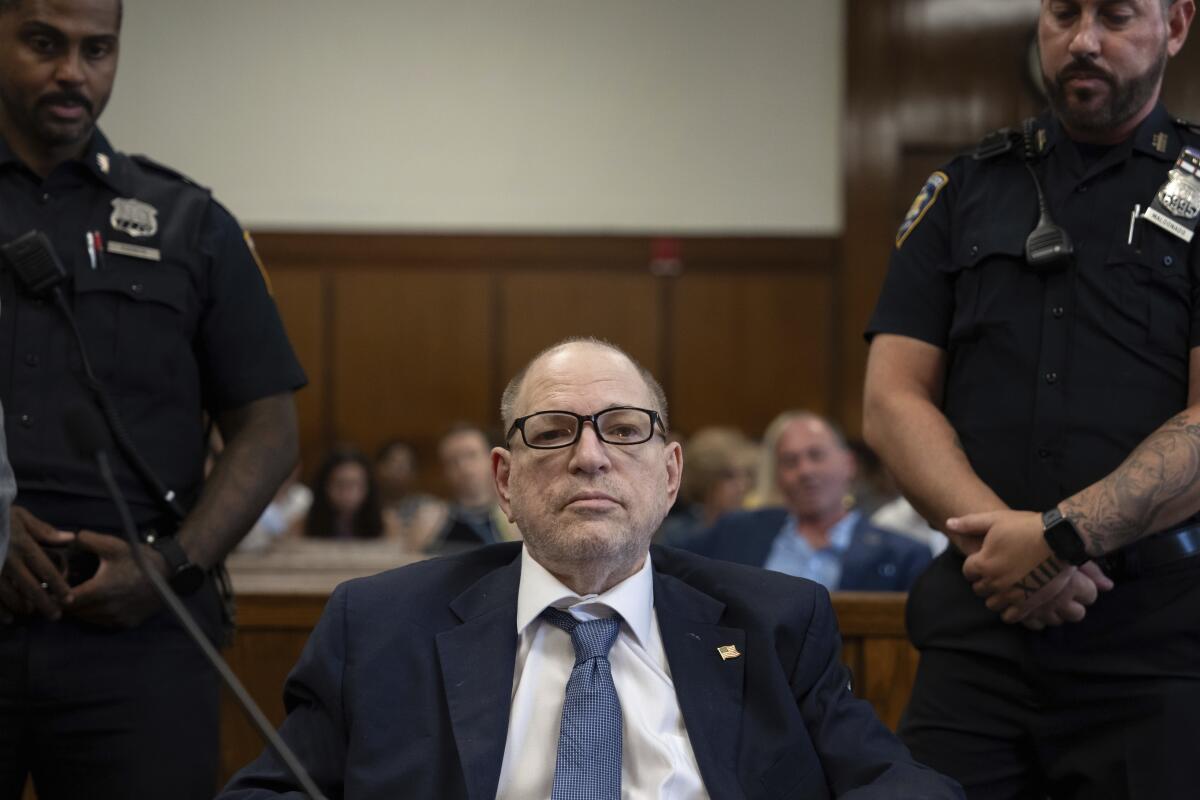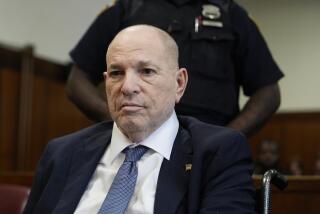Harvey Weinstein may be extradited to California after Newsom signs warrant

- Share via
Gov. Gavin Newsom has signed an extradition warrant seeking the transfer of Harvey Weinstein from custody in New York to California, where he was previously convicted on rape charges.
The move follows an April decision by a New York appellate court to overturn Weinstein’s rape conviction, though the underlying charges against him remain. Weinstein, 72, is still in custody in New York, where he is being held in a medical facility in Manhattan after being hospitalized for a COVID-19 infection, double pneumonia and other health conditions.
Weinstein’s New York conviction was overturned after appellate judges found a state judge erred in allowing three women to testify at trial despite no charges being filed against the movie mogul in connection with their accusations.
Newsom had 90 days after Weinstein’s conviction was dropped in late April to sign the extradition warrant, according to a New York state judge. The writ was signed June 19, and The Times requested a copy of the document from the governor’s office Wednesday.
After Harvey Weinstein won an appeal to overturn his New York rape conviction, legal experts say he faces a tougher hill to climb as he attempts a similar strategy in his California case.
The former Hollywood titan has been caught up in separate criminal processes in New York and California for years since his career was upended by allegations of rape and sexual assault in 2018.
He was convicted in 2020 in New York of rape and criminal sexual assault and was sentenced to 23 years in prison before the conviction was overturned earlier this year.
In Los Angeles, Weinstein was convicted in 2022 of the forcible rape, forcible oral copulation and sexual penetration by a foreign object of an Italian model in 2013. He was sentenced in 2023 to 16 years in prison in California.
The California sentence — coming when Weinstein was 70, in frail health and still needing to serve more than two decades in New York — appeared unlikely to be served.
But the overturned conviction in New York has raised questions about where Weinstein will serve his time while he awaits a September retrial.
His California conviction is still under appeal.
“We’re reviewing the significance of this extradition and how it will affect status of his case in California,” Weinstein’s California attorney, Mark Werksman, said.
Weinstein initially faced more than 11 counts of sexual assault stemming from allegations he raped and groped multiple women in hotel rooms in Los Angeles and Beverly Hills from 2004 to 2013.
His California trial included testimony from Newsom’s wife, Jennifer Siebel Newsom, who accused the then-mogul of raping her in a Beverly Hills hotel suite in 2005 when she was a struggling actor. The rape “destroyed me emotionally,” she told the jury.
Siebel Newsom was among several women to testify that Weinstein used his influence to isolate them in hotel rooms and assault them, in Los Angeles, Beverly Hills, Puerto Rico or Toronto. The details of her allegations had not been publicly disclosed before her testimony.
The other women in the case testified anonymously. The Times does not name victims of sexual assault unless they have spoken out publicly or asked to be identified. Siebel Newsom accused Weinstein of abuse in a 2017 Huffington Post essay that ran just days after major media outlets began publishing information about rape accusations against the Miramax co-founder. Her involvement in the Los Angeles trial was not widely known until The Times reported it in October 2022.
Jurors deadlocked on charges based on Weinstein’s alleged attacks on three women, including Siebel Newsom, and prosecutors dropped counts related to allegations made by a fourth woman.
In handing down Weinstein’s punishment, Los Angeles County Superior Court Judge Lisa Lench ruled he could not serve his California sentence concurrently with the New York sentence.
Times staff writer James Queally contributed to this report.
More to Read
Sign up for Essential California
The most important California stories and recommendations in your inbox every morning.
You may occasionally receive promotional content from the Los Angeles Times.












